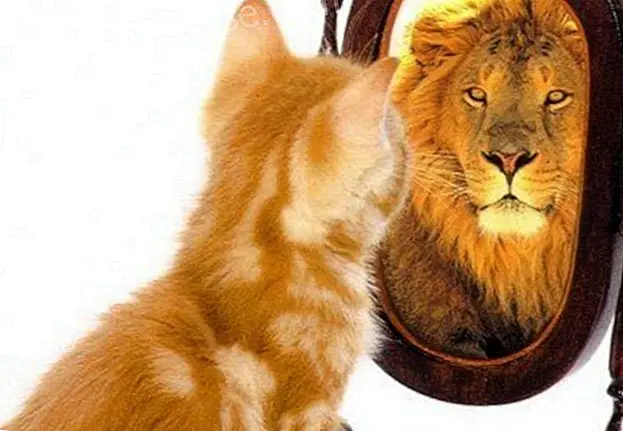
Surely they have always heard about children's need for limits, containment, communication, recreation, etc. Today I want to add something else and that I consider as important as all of the above, and is: The need of children to feel recognized.
We all need to be recognized ... don't you think so? Let the world tell us: "I accept you, I see you, I love you"; "I recognize who you are, what you do"; "I recognize the space you occupy in the world"; "We love you and we need you."
We all can surely recognize that when we feel that we don't have a place, that when the outside is indifferent to what I am, that when I feel judged, ignored, diminished, inside there is a feeling of emptiness and the need for the world to grow, and those who are meaningful to me, see me and value me for who I am and what I do.
If I am an adult and I recognize that this feeling is or was in me at some point, how can a child who is so transparent, sensitive and emotionally immature still affect what he receives or does not receive from outside?
Children need to feel recognized
All of you will have ever witnessed this situation: In a family reunion, or a meeting of any kind, all adults at the table start talking about their topics. A child who is there begins to do things that "attract attention." Some of these things can be funny, maybe he starts to sing, to make jokes, to act like a clown; Another reaction may be to interrupt and ask about the talks; and other times, start generating tantrums, conflict or fights.
These ways of reacting seek to say "here I am, look at me"; They seek to generate something to be looked at, not forgotten, not neglected, in short, the child seeks to be recognized.
Of course, every adult has the right to hold a meeting, and the child should learn to respect the spaces for dialogue and encounter between adults, but what I am going through with this example is that there is a natural force in the child that marks a need, to "be part", to feel approved, loved, looked at, recognized.
When this situation is repeated again and again in the family, at school or in any field, for example, when a child is diminished, when he is ignored, when we are indifferent and disinterested to his needs, when he asks us to let's look when he does a feat, "Papa looks!", and I don't know that this is really a need of the soul to feel highlighted in a place, when in a large family some child, maybe the middle one, doesn't find his place, or recognition within the family, when in a school everyone is treated as if by the same age they were all equal, when any of these situations or similar situations happen over and over again, the child feels outside, and generates situations for Have a place inside.
What are they asking us?
Here I invite you to look and interpret the different manifestations of children as communication of something else; so that we can really see that when they get our attention in one way or another, they are just telling us how much they need us. They are just telling us: “Please, here I am. Look at me! I need you to approve me, to love me with your recognition. Show me that I have a place that belongs only to me, that you value and take care of that place. ”
Everyone at heart has these questions in my soul "who needs me, who listens to me, who loves me?" "Where do I belong, I am worth the same as others, my feelings are accepted, am I treated fairly?"
Violence, aggressiveness, rebelliousness, apathy, rejection, and all those symptoms that children show today before the obsolete, devitalized and disinterested positions of adults are claims. The sole and great objective of these manifestations is for someone to recognize them and give them a place. They claim their place, they seek to generate it, if necessary, by force and whatever.
Who you are? Where you come from? Where are you going?
Not all children expect one to always agree with them, and surely neither, that in all cases their wishes will be taken into account, even if they express them with tenacity. But everyone wants to be perceived, and in truth, they want it in a deeper, more sincere and comprehensive way of what really happens.
If we are parents, educators, pedagogues, therapists and any professional who works with the child's physical, mood and / or spiritual world, we should ask ourselves if, above all, this child has a place where he feels recognized.
But I must clarify one point: it is not about praising the child for others or children "Bravo, how good, you are great!". It is also true that when the child is the center of attention for others, it is detrimental to their development.
What I am referring to is a real recognition of his Being, of his personal imprint. When we fall into praising merely the superficiality of the child, it is because we are not able to reach the real encounter with his Being, who is the one who really stands out for being unique in the world.
Children only need, and really demand, that every adult who presents himself as their guide and reference, ask themselves before them: “Who are you? Where you come from? Where are you going?"
If as adults we propose to look a child in the eyes, and inside let these three questions “Who are you? Where you come from? Where are you going? ” Echo within us and reach the interior of the child with true interest, real and genuine interest, my own spirit, my true identity, will meet the true identity of the child.
Just look him in the eyes in silence, hug him in silence, watch him sleep in silence and inside ask him and ask yourself: “Who are you? Where you come from? Where are you going?"
These questions will go beyond any character that the child presented to be loved and recognized, and we will reach his most intimate Being.
Who you are?…
Where you come from?…
Where are you going?…
By doing this we are leaving the comfort of always being judging the child for his bad behavior. We are generating a new inner movement within to give the child his true place: the place he has come to occupy in this family, in this school, in this world.
This is what we need most, what children need most today, when we see them angry, irritable, unbalanced. They need that we, the beings that have brought them, and that the adults that we present as their guides and referents, find ourselves Being to Being, grant them a genuine recognition of what they really are and remind them with our questions of who they are, Where they come from and where they are going.
Author: Nancy Erica Ortiz (Inspired by the book “I am You” by Anna Seydel)
www.caminosalser.com/nancyortiz
Children need to be recognized, by Nancy Erica Ortiz






